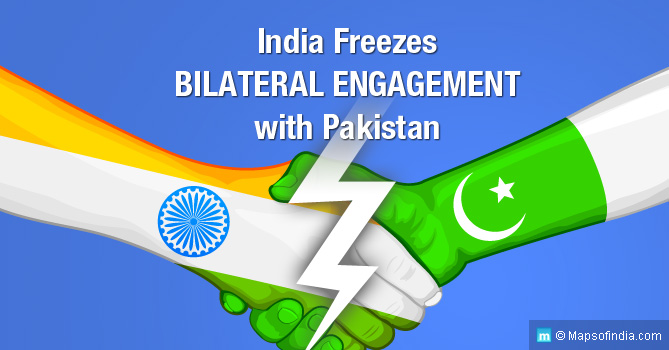Public pressure on the Narendra Modi government is building on to act against rogue Pakistan, the South Asian country whose army again indulged in brutal mutilation of two Indian soldiers’ bodies. Finance Minister Arun Jaitley who is looking after the Ministry of Defence also, has delayed his visit to Japan where he was supposed to attend the annual Asian Development Bank meeting. The government has given Indian army free hand to punish inveterate Pakistan for its dastardly act, fifth time since 1999. Even as none of these abominable acts of Pakistani army have gone unanswered in the past and killing of several terrorists and Pakistani army soldiers in the Indian army-led surgical strikes across the Line of Control in September 2016 is a crude reminder in this regard. But the manner Pakistan showers humiliations on Indian soldiers’ bodies, it shows this South Asian country’s deep, unfathomable hatred towards India; though, the fact is that both are neighbours who share the same racial, ethnic, cultural and historical roots. Therefore, India would have to undertake short, medium and long-term strategy to deal with Pakistan, a rogue nation which is exceptional one in the world for making terrorism a part of its state policy.
Timing of incident
What surprises analysts is that beheading incident took place soon after Indian industrialist Sajjan Jindal’s meeting with Prime Minister Nawaz Sharif in Islamabad as well as in the hill station of Murree in Pakistan. Jindal shares bonhomie with Prime Minister Narendra Modi as well. Since both Prime Minister Modi and his Pakistani counterpart Sharif are expected to attend Shanghai Cooperation Organisation’s annual meet in Kazakhstan in June, it is easy to comprehend why Jindal could have met Pakistan Prime Minister Sharif. Since 1999, it has been witnessed that whenever India tried to extend its hands of friendship towards Pakistan, this country’s army has used every dirty trick at its disposal to sabotage the relationship. In response to Prime Minister Modi’s surprise stopover in Pakistan to meet his counterpart Sharif on December 25, 2015, Pakistan Army in collusion with the country’s Inter-Services Intelligence carried out terrorist attack on Pathankot air base in January 2016.
Does tension favour Pakistan army?
Pakistan army wants discontent between the two countries to simmer. The more the tension is there, the more Pakistan army gets rewards in terms of hike in defence budget and gaining of public trust as a savior of the nation. Already, it is stoking flames of anger in Kashmir by encouraging youth to resort to violence against the state and by infiltrating terrorists to target military camps. Even Kashmir’s school girls have been roped in to create trouble in the Valley and elsewhere in Jammu and Kashmir.
What options does India have to handle Pakistan?
India has several options on the table to inflict deep pain on Pakistan and these include mounting a heavy artillery assault across the LoC, abrogating the Indus Waters treaty and barring all bilateral economic arrangements. Already, by getting annual SAARC meet scrapped, Pakistan has been diplomatically isolated in the region. The US has also stopped over $300 million worth of assistance, while Russia has put in shelve its decision to sell helicopters and holding the second joint military exercise with Pakistan. Beyond such diplomatic measures, New Delhi needs to show Pakistan that containing tension from becoming a full-fledged nuclear war is not just the moral responsibility of India, rather Islamabad is also responsible. Pakistan army always tries to turn an ideological war with India into a tactical victory because it thinks New Delhi is bound by a moral burden. Islamabad thinks it can get away by blackmailing India with the fear of nuclear war. But in dealing with an enemy which doesn’t respect rules, convention or norms, India should steer clear off any moral and ethical boundaries and should hit Pakistan hard. To this account, not only military options are available, but also political options are there. India should consistently raise at bilateral and multilateral forums human rights abuse of people in Gilgit and Baltistan; it should allow Baloch people to form a government in exile, while encouraging more secessionist agenda across length and breadth of Sindh which is also boiling with discontent.
Conclusion
India should forget that Pakistan would behave well with it and mend fences. Animosity is deeply entrenched in Pakistan army’s hearts and mind. It will never allow its civilian administrator to have good handshake with Indian authorities. Pakistan army will make its country’s democracy functional till the time it allows soldiers to milk money and use power at the cost of the national interest. Therefore, instead of taking a knee jerk military reaction, time has come when India should draft a strategy to bring Pakistan to knees and for this, there are no dearth of options on the table.




